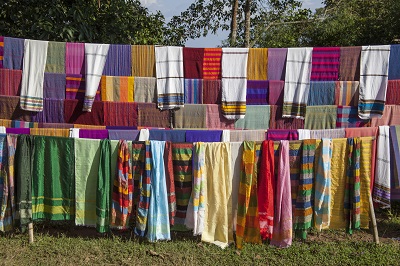
If you were a poor person in a poor country, would you choose to work in a sweatshop, or be your own boss, buying and selling in the local market? Which would you value more- security and stability, or variability with the potential for income growth? And should we really be pressing for more sweatshops in poor countries, as many economists- from Krugman to Sachs, seem to advocate of late?
If you haven’t listened to this week’s EconTalk episode, I hope you do, as I think you’ll find it challenging. Host Russ Roberts, as filled with humility as any economist I know, says, “I don’t know how to solve all the problems of the world at one time, but when I see people desperately trying to do something, I assume they are trying to better themselves, and probably know more about their situation than I do.” So when 300 people line up to vie for 50 jobs in a factory (or WalMart), their revealed preferences suggest that these jobs beat the alternatives. Right??? Chris Blattman of the University of Chicago returns this week, and challenged a lot of my thinking (and his own, he tells Russ) about just how good an alternative employment in a sweatshop is for people in developing countries.
Blattman and Stefan Dercon conducted a fascinating experiment in Ethiopia, trying to tease out the trade-offs people make in their employment choices. Blattman admits he assumed that stability would be prized over the risk inherent in entrepreneurship, but the results they got surprised him. See if they surprise you, too, and let us know your thoughts. We love to hear from you!

READER COMMENTS
Jon Murphy
Dec 29 2016 at 8:50pm
I listened to that podcast yesterday. I was very surprised by their result. Still pondering it over, trying to come up with an answer.
Bill
Dec 30 2016 at 7:13am
[Comment removed pending confirmation of email address. Email the webmaster@econlib.org to request restoring this comment. A valid email address is required to post comments on EconLog and EconTalk.–Econlib Ed.]
Miguel Madeira
Dec 30 2016 at 9:31am
“So when 300 people line up to vie for 50 jobs in a factory (or WalMart), their revealed preferences suggest that these jobs beat the alternatives.”
Usually the alternative is not be an entrepreneur, is to be an unemployed (it is possible that some of those people tried to be entrepreneurs, but failed).
JK Brown
Dec 30 2016 at 1:16pm
The interview reveals, by happenstance, the value of being an entrepreneur. Something that is increasingly becoming the case in the US as well.
Not in the transcript yet, but near the end, as a detail, we discover that the people being considered for the jobs are limited to 18-28. That, skipped over, reveals that given the job turnover and company life-cycles, the best bet is to get out of the factories and not lose your, perhaps ad hoc, but under your control, means of making a living.
In the US, if you hit 50, and end up out of a job, you are also not in the hiring demographic.
But all in all, a good interview. And one that should be listened to just to dispel the “starving Africa” meme propagandized by the NGOs in their efforts to ensure their directors might continue to live in the luxury they’ve become accustomed to.
Comments are closed.